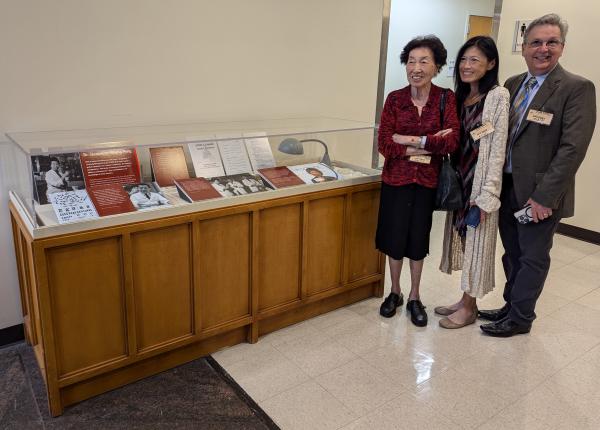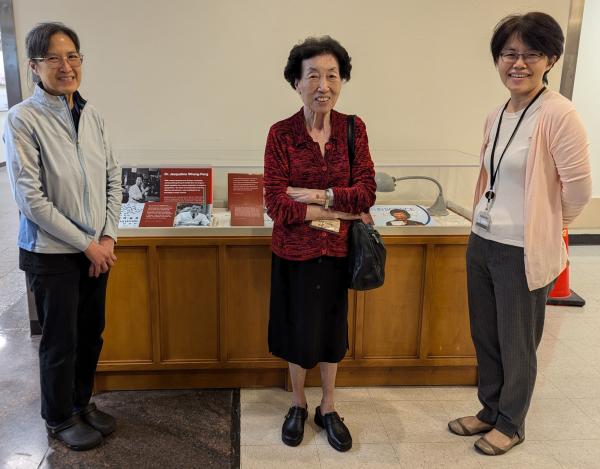From the Annals of NIH History
Jacqueline Whang-Peng Visits Clinical Center Display Featuring Her Work
BY OFFICE OF NIH HISTORY AND STETTEN MUSEUM STAFF
Jacqueline Jia-Kang Whang-Peng returned to the NIH this October to claim her slice of NIH history. Accompanied by family members, former colleagues, NIH scientists, and the curatorial staff of the Office of NIH History and Stetten Museum, Whang-Peng visited a new display in the Clinical Center featuring her work and life.

CREDIT: EMILY CHIN-HSIEN TAI
Jacqueline Whang-Peng stands before the display honoring her work as chief of NCI’s Cytogenetic Oncology Section from 1960 to 1994.
Whang-Peng was chief of NCI’s Cytogenetic Oncology Section from 1960 to 1994, a position that few women, let alone Asian women, held at the time. An expert in cytogenetics, which is the study of chromosomes and their effect on cell behavior, she contributed to our knowledge of many cancers.
In 1960, the role of chromosome (gene) changes as a cause of cancer was not yet recognized because there was not an established technique for observing chromosome changes in the laboratory. Whang-Peng and her mentor, Joe Hin Tjio, developed the technique to prepare mammalian cells for chromosomal research, observing and analyzing the chromosomes inside of the cell. Their 1962 paper described a “squash” method and an “air-dry” method. One of her first results was the ability to study leukemia in tissue culture.
Whang-Peng quickly became the primary consultant on chromosomal abnormalities and cancer at NIH and collaborated with scientists from within NCI—helping to research a stunning number of cancers—as well as researchers from other NIH institutes and outside of NIH.

CREDIT: EMILY CHIN-HSIEN TAI
Whang-Peng, her daughter Sarah Freedman, and her son-in-law Scott Freedman at the display. Sarah Freedman described how her mother would bring home chromosome sheets for the children to help her cut up.
In 1972, Whang-Peng became one of the first two women to win the Arthur S. Flemming Award honoring outstanding young federal workers, being recognized for her chromosomal and leukemia research. In 2008, Whang-Peng added the L’Oréal-UNESCO Award to her long list of honors. She was the first Taiwanese national to receive the award, which celebrates the accomplishments of women scientists.
Born in mainland China in 1932, Whang-Peng and her family fled to Taiwan in 1949 to escape the Chinese Civil War. She was the first woman trained in surgery at National Taiwan University’s Medical College (Taipei), earning her M.D. in 1956, and the first female surgeon from Taiwan to do an internship in the United States. During her internship at Boston’s New England Hospital, the plight of people with cancer inspired her to change her focus, leading to her career at NCI.

COURTESY OF: EMILY CHIN-HSIEN TAI
Susan Wong (NHLBI/ORS), Whang-Peng, and Emily Chin-Hsien Tai (NCI) at the display. Tai arranged the visit and escorted the family. Wong contacted the Office of NIH History and Stetten Museum, which set the wheels for the display in motion.
After retiring from a career at NIH spanning more than three decades, Whang-Peng returned to Taiwan. A dynamo of energy, she has had a fruitful second career establishing research programs, training investigators, and conducting public education in cancer prevention and treatment. She is still working, even though she is in her early 90s.
The display about Whang-Peng is located on the first floor of the NIH Clinical Center, toward the Lipsett Amphitheater near the entrance to the Bioethics Office—next to our antique microscope display.
This page was last updated on Monday, January 6, 2025
